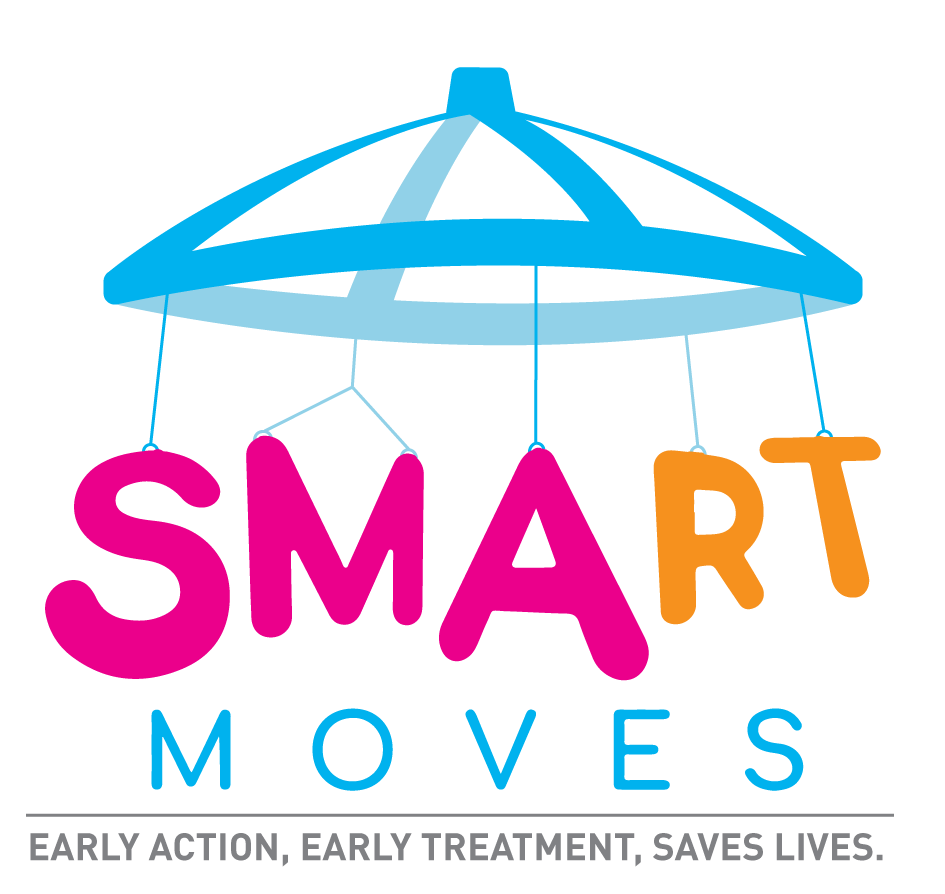About SMA for Healthcare Providers
Spinal muscular atrophy (SMA) is a genetic, progressive neurodegenerative disease characterized by weakness of the skeletal and respiratory muscles.
About SMA for Healthcare Professionals
The following topics are meant to serve as a helpful overview for healthcare providers who are new to SMA and/or providing care to individuals with SMA.

Genetics of SMA
SMA is caused by a mutation in the SMN1 gene, leading to severe and debilitating muscle weakness.
Testing/Diagnosis
An SMA diagnosis must be confirmed through genetic testing, usually after noticing SMA symptoms.
Newborn Screening
Evidence shows early diagnosis and treatment, like via newborn screening, leads to better outcomes.
Treatment
Individuals or families can make treatment choices based on their needs, goals, and values.
Care Management
An overview of management of symptoms and day to day care for patients with SMA.
SMArtMoves, an education campaign geared toward new parents and healthcare providers, helps them recognize delayed milestones. Find clinical resources and videos on how to identify muscle weakness, view a motor surveillance tool, and download a screening and referral algorithm.
Diagnosing SMA
Early diagnosis makes a difference. SMA is often diagnosed on a clinical basis by how a child appears physically. The diagnosis may be suspected when children are noted to be weak or to have a delay in their developmental milestones, have low muscle tone, difficulty holding their head up, rolling over, sitting independently, or standing/walking later than would be expected. A thorough medical history is performed, and a primary care provider may order genetic testing through a blood sample. A child may be referred to a pediatric neurologist who will also perform an examination and order genetic testing.
Complications of SMA
Proper care improves quality of life for those with SMA. They often have impaired cough, respiratory insufficiency, dysphagia, gastroparesis, constipation, and evolving orthopedic issues. Certain equipment can help, from respiratory support during sleep (e.g., BiPAP) and mucus clearance devices to gastrostomy tubes, wheelchairs, and braces. Cognitive development is usually not affected. Usual primary care practice—especially care coordination, support, and routine care including immunizations, developmental surveillance, and monitoring of growth—contribute to the overall well-being of patients.
Care Management
In 2007, the Journal of Child Neurology published the “Consensus Statement for the Standard of Care in SMA”. In 2018, updates were published for the SMA standard of care:
- Diagnosis and Management of SMA: Part 1: Recommendations for diagnosis, rehabilitation, orthopedic and nutritional care
- Diagnosis and Management of SMA: Part 2: Pulmonary and acute care; medications, supplements, and immunizations; organ systems; and ethics
These guidelines are summarized in the following recommendations for care management of SMA. Additional clinical resources are also available here.
A simple blood test can confirm whether an individual has a mutation that causes SMA. If it is a positive gene test, then the diagnosis is confirmed. Although, 5% of people with the symptoms of SMA can have a negative SMN gene test and may require additional diagnostic testing. These tests can include an electromyography study (EMG), nerve conduction study (NCS), and/or a muscle biopsy and blood tests to help rule out other forms of muscle disease. If a positive test is confirmed, then it is important for individuals and/or families to discuss these results with their doctor or genetic counselor. Individualized planning for patients is very important, to help understand and prepare for daily life, as well as how to respond to medical emergencies that could occur.
Respiratory problems are primary causes of illness and the most common cause of death for individuals with SMA Type 1 and 2. It is important to learn about maintaining a clear airway for all SMA patients, discuss breathing and support options with the medical team, develop a care plan with the medical team to prevent any issues, and work with the medical team to develop a care plan for responding to acute illness, such as a cold or flu to minimize the effects of respiratory infection.
Patients with SMA are more susceptible to suffering from under- or over-nutrition, and this can have a significant impact. It is important for the medical team, including nutritionists, dieticians, and/or therapists specializing in speech to monitor growth in children and work with the individuals and/or families to develop a personalized feeding and nutrition plans. The medical team should work with the individual and/or family on solutions for any swallowing, gastric reflux, or constipation issues. It is important for the medical team to monitor any eating or digestive problems if they arise that could lead to aspiration pneumonia.
Muscle weakness in SMA will vary for each individual depending on the disease severity. Physical therapists, occupational therapists, speech therapists and/or rehabilitation specialists are the experts who can help the family and the rest of the medical team design the best care plan. A physical therapist can design an individualized physical therapy plan to support function and help slow additional complications. It is also important to consult with the medical team about evaluation from an orthopedic specialist.
It is important for families to plan for how to prevent emergencies. When an emergency occurs, it is important to have a knowledgeable healthcare team’s support. Individuals and/or families should share their plans and management goals with all healthcare professionals involved in their care.



